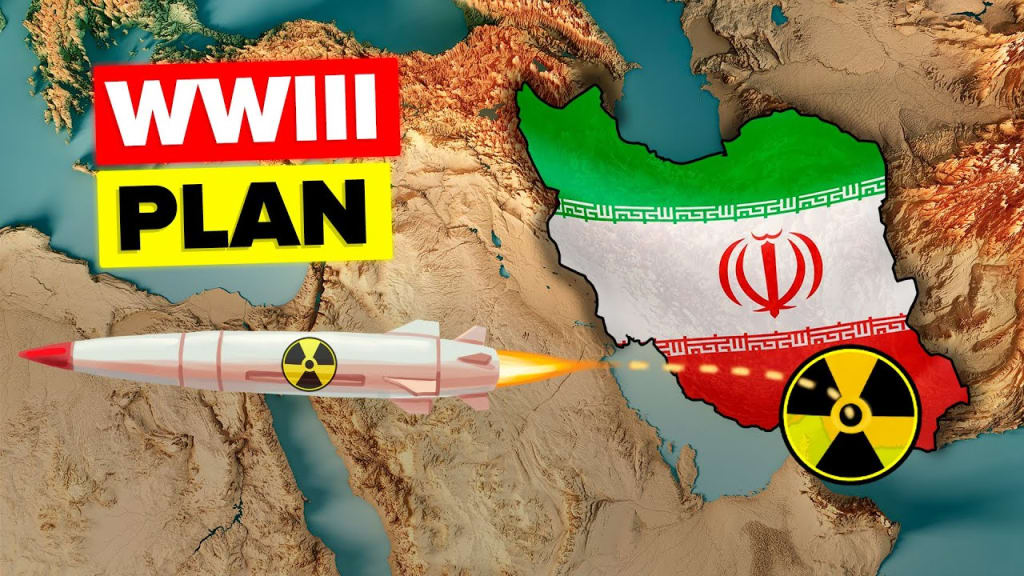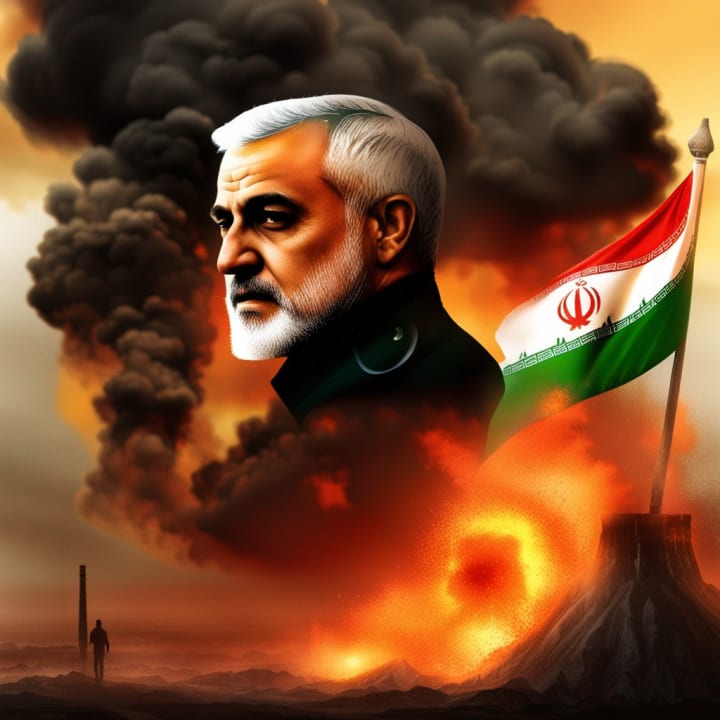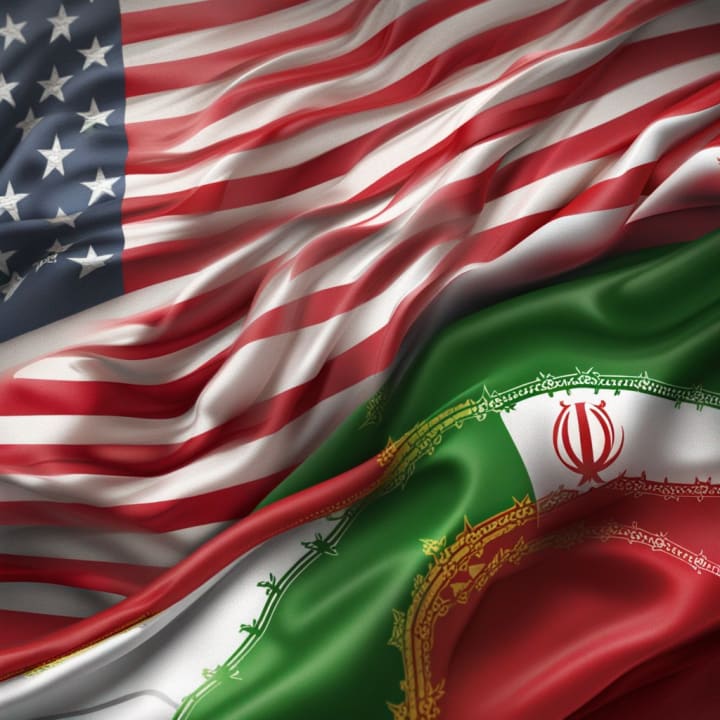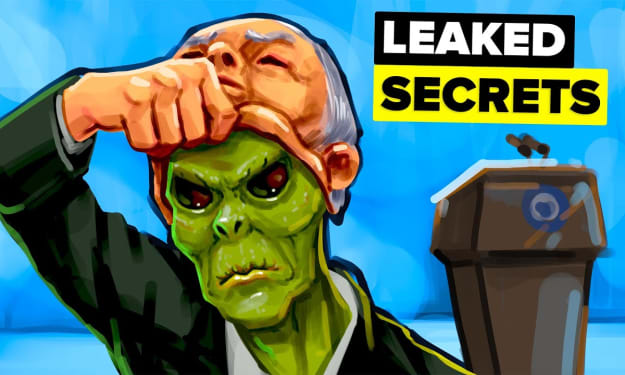What is Iran’s World War 3 Plan and how does it affect global security?
Iran is a key player in the Middle East, with a powerful military and a controversial nuclear program. Despite signing the Non-Proliferation Treaty, Iran has faced accusations of developing nuclear weapons. How likely is Iran to trigger a global war with its nuclear ambitions? In this narrative, we will explore Iran’s military capabilities and challenges, and how they affect the world’s stability 🏴☠️🚨🌎

Iran is a key player in the Middle East, with a powerful military and a controversial nuclear program. Despite signing the Non-Proliferation Treaty, Iran has faced accusations of developing nuclear weapons. How likely is Iran to trigger a global war with its nuclear ambitions? In this narrative, we will explore Iran’s military capabilities and challenges, and how they affect the world’s stability 🏴☠️🚨🌎

How Iran Could Spark World War III
The world has witnessed two devastating world wars in the 20th century, but could a third one be on the horizon? The lingering enmity between Iran and the United States is one of the likeliest hot spots to spark a global conflict, as both nations have been locked in a tense standoff over Iran’s nuclear ambitions and regional influence. In this blog post, we will explore the history of the US-Iran relations, the current state of affairs, and the possible scenarios that could lead to a full-scale war that could drag other major powers into the fray.

The Roots of the Conflict
The US and Iran have not always been enemies. In fact, they used to be allies until the 1979 Iranian Revolution, when a popular uprising led by Ayatollah Khomeini overthrew the western-backed dictator Mohammad Reza Pahlavi, also known as the Shah. The Shah had ruled Iran with an iron fist, concentrating the oil wealth among the elite and inviting western influence that violated many Islamic rules. The revolution was a backlash against his oppressive and corrupt regime, and a rejection of western interference in Iran’s affairs.
The new Islamic Republic of Iran was hostile to the US and its allies, and soon became embroiled in a bloody war with neighboring Iraq, which was supported by the US and other Arab states. Iran also began to pursue a nuclear weapons program, seeing it as a matter of national survival and deterrence against its enemies. The US and its allies tried to prevent Iran from acquiring nuclear weapons, imposing sanctions and conducting covert operations to sabotage its nuclear facilities.

The Nuclear Deal and Its Collapse
In 2015, after years of negotiations, Iran and six world powers (the US, China, France, Germany, Russia, and the UK) reached a landmark agreement known as the Joint Comprehensive Plan of Action (JCPOA), or simply the nuclear deal. The deal aimed to limit Iran’s nuclear activities in exchange for sanctions relief and economic benefits. Under the deal, Iran agreed to reduce its stockpile of enriched uranium by 98%, remove two-thirds of its enrichment centrifuges, and allow international inspections of its nuclear sites. In return, the UN Security Council lifted most of the sanctions imposed on Iran, giving it access to billions of dollars in frozen assets and foreign markets.
The deal was hailed as a diplomatic breakthrough that could pave the way for better relations between Iran and the West and reduce the risk of a nuclear war in the Middle East. However, not everyone was happy with the deal. Some critics argued that it did not address Iran’s ballistic missile program, its support for militant groups in the region, and its human rights violations. Others feared that Iran would cheat on the deal or resume its nuclear activities once the restrictions expired.
One of the most vocal opponents of the deal was Donald Trump, who became the US president in 2017. He called the deal “the worst deal ever” and vowed to withdraw from it and reimpose sanctions on Iran. He accused Iran of violating the spirit of the deal by continuing to test missiles, sponsor terrorism, and destabilize the region. He also demanded that European allies stop trading with Iran or face consequences.
In 2018, Trump fulfilled his promise and pulled out of the deal, triggering a crisis that has yet to be resolved. Iran responded by gradually reducing its compliance with the deal, increasing its uranium enrichment levels and installing more advanced centrifuges. It also stepped up its military activities in the region, arming and training Shiite militants in Syria, Iraq, Lebanon, Yemen, and elsewhere. It also clashed with US forces several times, shooting down a US drone, seizing a British tanker, and launching missile attacks on US bases in Iraq.

The Biden Administration and Its Challenges
In 2020, Trump ordered a drone strike that killed Qassem Soleimani, the commander of Iran’s elite Quds Force and one of the most influential figures in Iran. The assassination sparked outrage in Iran and across the Muslim world and brought both countries to the brink of war. Iran retaliated by firing missiles at US bases in Iraq, injuring dozens of US soldiers but avoiding any fatalities. Both sides then de-escalated the situation, but tensions remained high.
In 2021, Joe Biden became the US president and inherited a volatile situation with Iran. Biden has expressed his willingness to rejoin the nuclear deal if Iran returns to full compliance with it. He has also signaled his desire to engage in diplomacy with Iran and address other issues of concern beyond its nuclear program. However, he has also maintained that he will not tolerate a nuclear-armed Iran or allow it to threaten US interests or allies in the region.
Biden faces several challenges in his attempt to revive the nuclear deal and restore stability in the Middle East. First, he has to overcome the distrust and animosity that have built up between the US and Iran over the years, especially after Trump’s withdrawal from the deal and Soleimani’s killing. Second, he has to deal with the domestic opposition from both Republicans and Democrats who are skeptical of Iran’s intentions and the effectiveness of the deal. Third, he has to coordinate with the other parties to the deal, especially the Europeans who have tried to keep the deal alive despite US pressure, and the Russians and Chinese who have their own interests and agendas in the region. Fourth, he has to contend with the regional rivals of Iran, such as Israel, Saudi Arabia, and the UAE, who are wary of Iran’s nuclear ambitions and regional influence, and who may take matters into their own hands if they feel threatened by Iran.

The Scenarios for War
The US and Iran are not eager for a direct war, as they both know that it would be costly and destructive for both sides and for the region. However, there are several scenarios that could trigger a war, either by accident or by design.
One scenario is that Iran decides to break out of the nuclear deal and pursue a nuclear weapon, either because it feels cornered by US sanctions and pressure, or because it sees an opportunity to gain an advantage over its enemies. This would provoke a swift and decisive response from the US and its allies, who would launch airstrikes or cyberattacks on Iran’s nuclear facilities, or even use special forces or covert operations to sabotage or destroy them. Iran would retaliate by unleashing its proxy forces against US targets in the region, or by launching missiles or drones at US bases or ships. This could escalate into a full-scale war that could involve other regional actors as well.
Another scenario is that Iran uses its proxy forces to attack US interests or allies in the region, either to deter US pressure or to advance its agenda. For example, Iran could instruct its Shiite militias in Iraq to attack US troops or diplomats there, or it could supply its allies in Yemen with more sophisticated weapons to target Saudi Arabia or UAE. It could also use its Hezbollah allies in Lebanon to launch rockets or infiltrate Israel’s borders. The US would respond by targeting Iran’s proxies or their sponsors in Iran, either with airstrikes or special operations. Iran would then escalate by attacking US assets directly, or by blocking the Strait of Hormuz, a vital waterway for global oil trade. This could also spiral into a wider war that could draw in other regional players.
A third scenario is that a third party provokes a war between the US and Iran, either intentionally or unintentionally. For example, Israel could launch a preemptive strike on Iran’s nuclear facilities, fearing that Iran is close to acquiring a nuclear weapon. This would force the US to either support Israel or try to restrain it, while Iran would retaliate against both Israel and the US. Alternatively, a rogue actor such as a terrorist group or a hacker could stage a false flag attack on either side, such as blowing up a ship or a facility, or hacking into a missile system or a power grid. This could create confusion and mistrust between the US and Iran and lead them to blame each other and respond with force.

The Consequences of War
A war between the US and Iran would have devastating consequences for both countries and for the world. It would cause massive casualties and destruction on both sides, as well as among civilians and innocent bystanders. It would disrupt global oil supplies and trade, leading to economic turmoil and instability. It would inflame sectarian tensions and violence across the Middle East, creating more chaos and suffering for millions of people. It would also create more opportunities for extremist groups such as ISIS or al-Qaeda to exploit the situation and spread their ideology and terror.
A war between the US and Iran could also drag other major powers into the conflict, either directly or indirectly. China and Russia, who have strategic ties with Iran and oppose US hegemony in the region, could provide diplomatic, economic, or military support to Iran, or even intervene on its behalf if they feel their interests are threatened. This could create a dangerous confrontation between nuclear-armed states that could escalate into a global war.

The Prospects for Peace
The US and Iran are not doomed to go to war with each other. There are still ways to avoid a catastrophic conflict and find a peaceful solution to their differences. The most urgent task is to revive the nuclear deal and ensure that Iran does not acquire nuclear weapons. This would require both sides to show flexibility and goodwill, as well as respect each other’s legitimate interests and concerns. The US would have to lift some of the sanctions on Iran and offer incentives for its compliance with the deal. Iran would have to reverse its violations of the deal and allow full transparency of its nuclear activities. Both sides would also have to engage in dialogue and diplomacy to address other issues beyond the nuclear program, such as regional security, human rights, terrorism, etc.
The US and Iran would also have to work with other parties involved in the deal, especially the Europeans, the Russians, and the Chinese, who have a stake in the stability of the region and the success of the deal. They would have to coordinate their efforts and pressure to ensure that both sides adhere to their commitments and refrain from provocative actions. They would also have to mediate and facilitate dialogue between the US and Iran, as well as between Iran and its regional rivals, such as Israel, Saudi Arabia, and the UAE.
The US and Iran would also have to de-escalate their military tensions and avoid any miscalculations or accidents that could spark a war. They would have to establish channels of communication and crisis management to prevent misunderstandings and misperceptions. They would also have to exercise restraint and caution in their use of force or threats, and respect international law and norms. They would also have to cooperate on common challenges and threats, such as terrorism, extremism, pandemics, etc.
The US and Iran have a long history of animosity and mistrust, but they also have a chance to overcome their differences and find a peaceful way forward. A war between them would be disastrous for both countries and for the world, but a peace between them would be beneficial for both countries and for the world. The choice is theirs to make.
📝 SOURCES






Comments
There are no comments for this story
Be the first to respond and start the conversation.